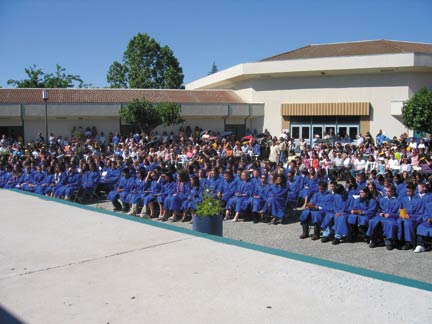In his 50-year-plus farming career Joe Gonzales, having learned
from his father when he was a child, has worked thousands of acres,
raising livestock and planting almost every kind of crop that
brings a price in the Santa Clara Valley.
In his 50-year-plus farming career Joe Gonzales, having learned from his father when he was a child, has worked thousands of acres, raising livestock and planting almost every kind of crop that brings a price in the Santa Clara Valley.
In recent years, however, a seemingly unending flurry of high costs, low yields, general economic malaise, regulatory hurdles and his own declining health finally led Gonzales, 68, to file a Chapter 12 bankruptcy petition for G & G Farms, which he started in north Morgan Hill with his father, according to his farm foreman Dean Bettcher.
The family farm used to be crowded with livestock, as Gonzales ran a cattle ranch in Gilroy for several years. With costs growing higher, Gonzales sold his cows last year in what would turn into an ongoing effort to save his property, explained Bettcher, who has worked at G & G for about 10 years.
Gonzales also used to run a summer horseback riding camp at Calero Ranch Stables, just upstream from Calero Reservoir. That camp served about 600 kids a year from age 6 to 14, Bettcher said. Then, after about five years trying to meet the county’s requirements to contain the E. Coli that trickled from the stables into the water supply, Gonzales had to vacate that property and indefinitely suspend the camp in October 2010.
“That was a bad loss with the horses,” Bettcher said. “Cattle and horses made his world go around.”
And that’s just the tip of the proverbial iceberg. After growing lima beans in one of his South Valley fields for several years, one year G & G “didn’t hit the crop we should have,” Bettcher said. “That hit a hole, and we had to crawl back out.”
Plus, while it wasn’t his biggest source of income, Gonzales used to cut brush for South County landowners neighboring G & G Farms’ site in north Morgan Hill. But recently some of the landowners stopped paying for this work, Bettcher said.
Finally, the bank told Gonzales they wanted their money for a mortgage on a 160-acre parcel he owns in southeast Gilroy, Bettcher explained. In a fatal, ironic twist, while Gonzales took other measures – such as selling his cattle – to try to save that property, it now appears he will have to sell the land in order to pay the bank and other creditors.
“The economy, selling the cows, not being paid by the landlords, getting out of horses,” Bettcher rattled off the maelstrom of bad fortune that led to Gonzales’ current financial difficulties.
Gonzales filed for bankruptcy in April. The case, which includes extensive negotiations with a list of people to whom G & G owes money, will likely take several months to resolve.
Encircling it all, Gonzales’ health has been in decline, according to his sister Elizabeth McIvor, who runs G & G Farms’ office on Laguna Avenue. Last week, Gonzales was in the hospital’s intensive care unit for sudden blood clots that formed in his lungs. In recent years, Gonzales has suffered from strokes and diabetes. In fact, Gonzales could not be interviewed for this story due to his health condition.
Throughout the 40 years or so G & G Farms has been in existence, it has grown crops on Gonzales’ property and fields he has leased all over South Santa Clara County, Bettcher continued.
Now, G & G Farms employs about 10 people and continues to harvest wheat and oats, as well as alfalfa and safflower hay on about 1,800 acres Gonzales leases in the area of Santa Teresa Boulevard, Richmond Avenue and Palm Avenue.
Bettcher and McIvor didn’t know exactly how much Gonzales owes his various debtors. His property near Frazier Lake is worth about $3 million, Bettcher said, and recovering that price would cover all his debts.
Chapter 12 is a rare form of bankruptcy, but it’s on the rise. Distinct from more common forms of bankruptcy for which consumers and a variety of businesses are eligible, Chapter 12 is reserved only for family farmers and fishermen.
In order to qualify for Chapter 12, at least half of the farmer’s debt must be farm-related, and at least half of his annual income must be farming-related, according to Nelson Enmark, trustee for Gonzales’ case and for bankruptcies throughout the Central Valley and Nevada.
Chapter 12 allows the farmer or fishermen to structure a court-approved plan, over which the creditors do not have a power of veto, to pay back their short-term debts in three to five years, Enmark explained.
Last year, in the San Jose division of the Northern California district of the U.S. Bankruptcy Court, no Chapter 12 pleadings were filed, according to court spokesman Roger White.
In 2009, two such filings were made, White continued. But already in 2011, five farmers or fishermen have applied for Chapter 12.
By contrast, Chapter 7 and Chapter 13 filings in the San Jose division – which covers Santa Clara, San Benito, Santa Cruz and Monterey counties – are “in the thousands” each year, White said. He did not have exact numbers at press time.
The souring economy nationwide has resulted in an overall rise in bankruptcy filings, according to experts. In the U.S. last year, 723 people filed for Chapter 12, while about 1.1 million filed for Chapter 7, the most popular form of bankruptcy. Those numbers are up from 376 for Chapter 12 in 2007, and about 519,000 the same year for Chapter 7, according to the U.S. Courts’ web site.
“Bankruptcy does not discriminate, meaning that farmers as well as fishermen as well as Silicon Valley executives – all have the potential to go bankrupt,” said financial consultant Brad Ledwith. “The 2008 downturn and recession has affected everybody.”
Gonzales can “make a good living selling hay,” which comprises the bulk of his current business, Bettcher said. G & G Farms has a strong base of local customers that will likely continue returning as long as the farm is open.
Chrispin Gonzalez, 52, no relation to G & G’s owner, was at the farm’s hay storage facility Wednesday afternoon, retrieving a pickup-load of hay for his horses. Gonzalez lives in Sunnyvale but raises horses on a Morgan Hill ranch he leases.
Gonzalez and his seven brothers, who also raise horses, each buy hay from G & G Farms about once a week. If G & G closed, Gonzalez and his brothers would have to drive farther and pay more, probably for a lower-quality product.
“Here, it’s closer and a little cheaper,” Gonzalez said. “I feel bad (about the bankruptcy), but what can you do?”








